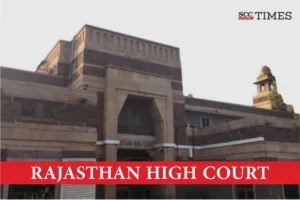Rajasthan High Court: In a writ petition challenging the delay by the Rent Appellate Tribunal in pronouncing the reserved judgment which violates the petitioner’s right to speedy trial under Article 21 of the Constitution of India, a single-judge bench of Anoop Kumar Dhand, J., acknowledged the inordinate delay and directed the Rent Appellate Tribunal to pronounce the judgment expeditiously as early as possible, preferably within a period of two weeks from the date of receipt of certified copy of this order. The Court held that the judgment can’t be kept reserved indefinitely after conclusion of arguments.
In the instant matter, the petitioner filed the present writ petition challenging orders dated 05-03-2024 and 11-03-2025 passed by the Executing Court (Rent Tribunal), which issued warrants under Order 21 Rule 35 CPC for vacating rented premises. The eviction was based on an order under Sections 6 and 9 of the Rajasthan Rent Control Act, 2001 initiated by the respondents (legal heirs of the original landlord).
The petitioner stated that he already filed a statutory appeal before the Rent Appellate Tribunal on 02-05-2024 and final arguments were heard on 28-01-2025, however, the case is repeatedly listed for pronouncement on various dates, 13-02-2025, 18-02-2025, 21-02-2025, and 24-03-2025 and yet, no judgment has been pronounced till date.
The Court expressed concern over the Rent Appellate Tribunal’s delay and observed that “it is not expected from the Rent Appellate Tribunal to keep the judgment reserved for an indefinite period, more particularly, when the arguments have been heard and concluded on 28.01.2025 itself…”
Referring to Balaji Baliram Mupade v. State of Maharashtra, (2021) 12 SCC 603 and Anil Rai v. State of Bihar, (2001) 7 SCC 318, the Court stressed that judicial discipline requires promptness in delivery of judgments and delay in same deprives a litigant of their legal remedy, right to speedy trial and violates Article 21 of the Constitution of India.
“The right of speedy and expeditious disposal of the case, trial is one of the most valuable and cherished right of a litigant guaranteed under Article 21 of the Constitution of India. It is an integral and essential part of the fundamental right of life and liberty enshrined under Article 21.”
The Court noted that under Order 20 Rule 1 CPC, judgments should ideally be pronounced within 30 days and not later than 60 days unless exceptional circumstances exist. The Court further noted that Section 19(8) of the Rajasthan Rent Control Act mandates that appeals must be disposed of within 180 days.
The Court upheld petitioner’s right to speedy trial and disposed of the writ petition with direction to the Rent Appellate Tribunal to “pronounce the judgment, expeditiously as early as possible, preferably within a period of two weeks from the date of receipt of certified copy of this order.” The Court also directed that no coercive action should be taken against the petitioner for a period of two weeks.
[Ramswaroop v. Ramesh Chand, 2025 SCC OnLine Raj 2691, Decided on 24-04-2025]
Advocates who appeared in this case:
Mr. Akshit Gupta with Ms. Pragya Seth, Mr. Ahmed Anas and Mr. Nakul Bansal, Counsel for the Petitioner


